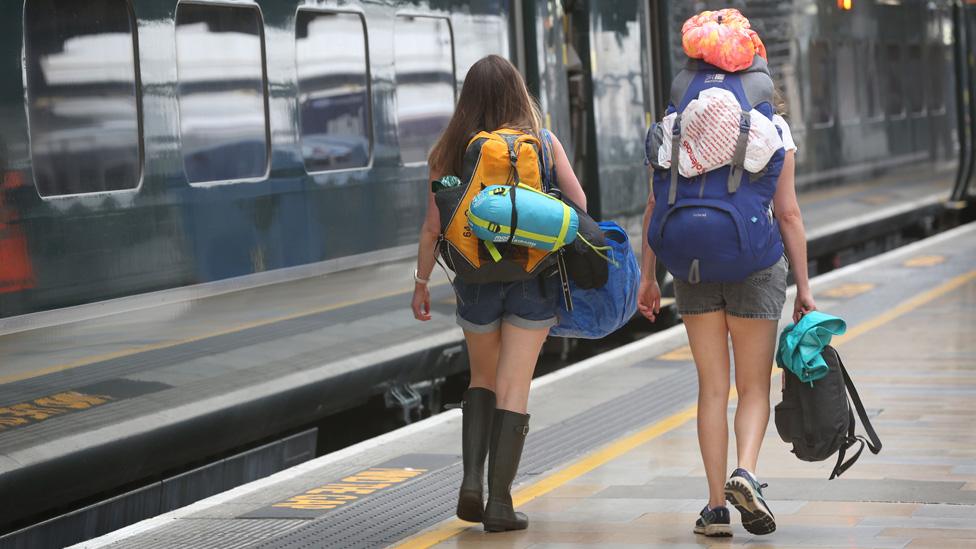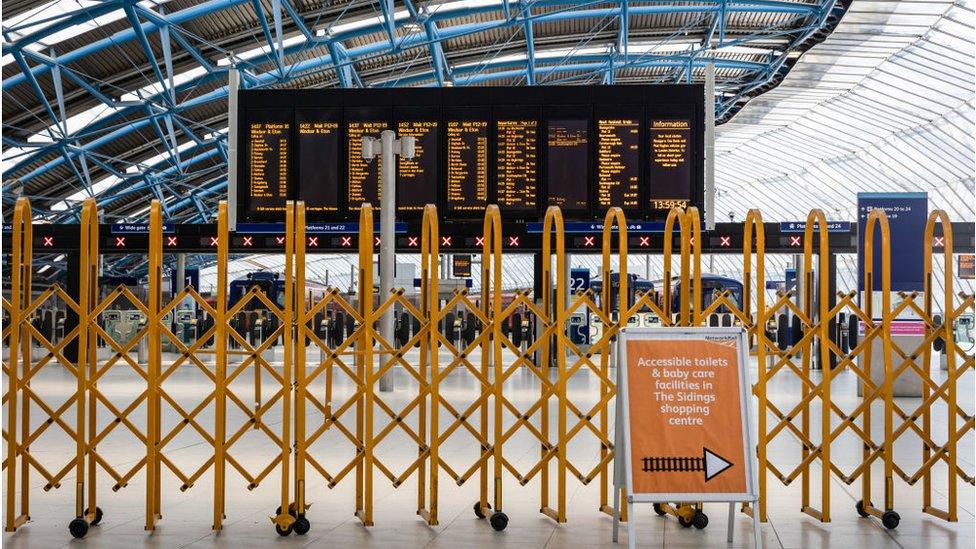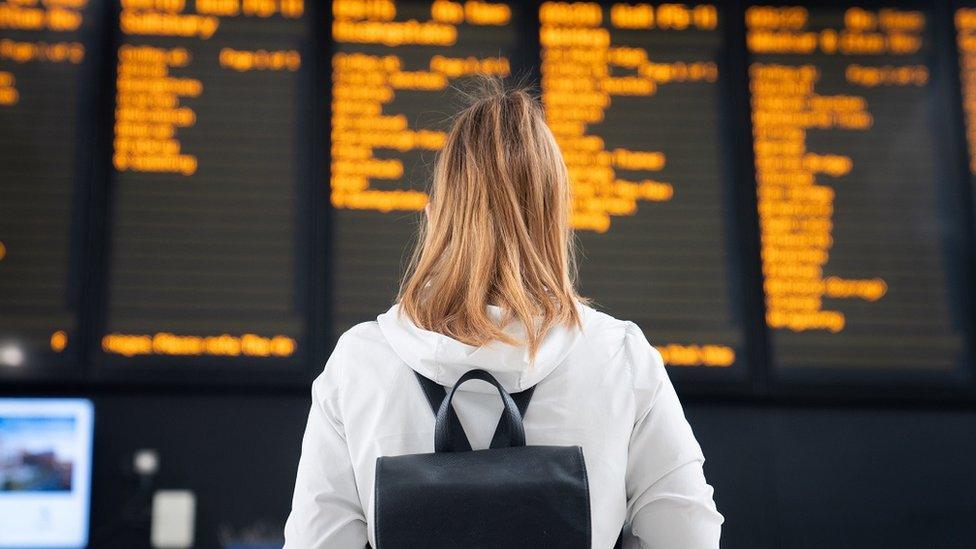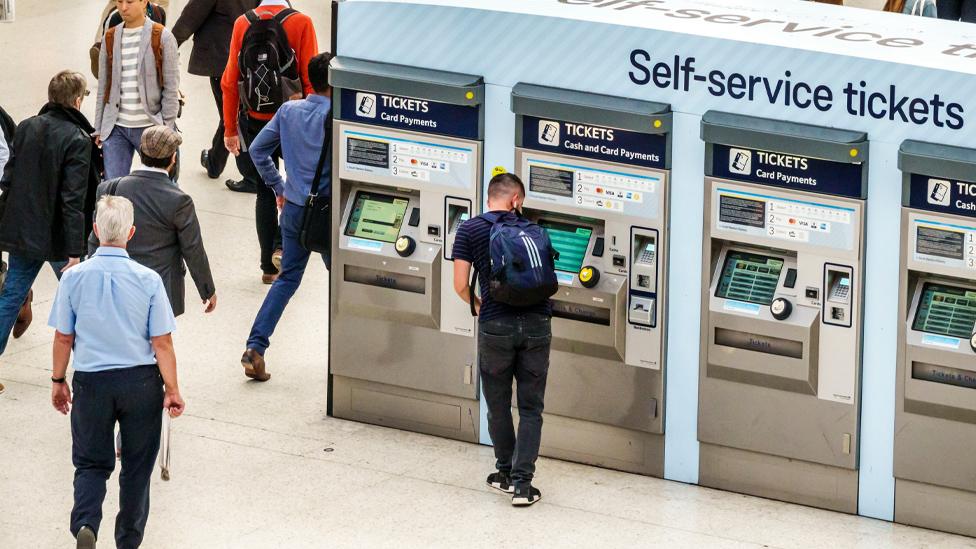Train strikes to hit major events including Reading and Leeds festivals
- Published

Travellers face major disruption this bank holiday weekend as rail workers across England walk out on Saturday.
Some 20,000 RMT union members at 14 rail companies are striking as part of a long-running dispute over pay.
Thousands will be travelling to events such as the Notting Hill Carnival and the Reading and Leeds festivals.
Separately, a plan to close ticket offices in England has further angered rail unions who warn there will be more strikes if a deal is not reached.
Transport Focus, an independent passenger watchdog, said a public consultation on the plans had received 460,000 responses ahead of the deadline of 1 September.
Saturday's RMT strike, which is its 24th since last summer, will see a reduced timetable in place in much of England, with some journeys into Scotland and Wales also affected.
Around half the usual train services will run and in many areas services will start late and finish much earlier than usual.
The Rail Delivery Group, which represents operators, said the strike was "designed to deliberately target passengers who want to enjoy various sporting events, festivals, and the end of the summer holidays".
The Department for Transport said the government had "played its part to try and end these disputes by facilitating fair and reasonable pay offers", adding that the RMT's strike action was "damaging its own industry's future".
The Night Time Industries Association, a trade group, called the walkout "reckless", saying it would leave major events like the Notting Hill Carnival and the Reading & Leeds Festival "in chaos as ticket holders attempt to navigate a limited transport network".
The RMT and train drivers' union Aslef have held a wave of strikes since last summer which have brought much of the rail network to a standstill.
The RMT has said the fresh strike action is happening because it had not received an improved offer, after rejecting the industry's latest proposals in the spring.
Its general secretary, Mick Lynch, told the BBC that union members were targeting Saturdays.
"The strike has to be effective," he said. "We haven't got a plan to disrupt anybody's particular activities but that is the busiest day for the railway and members have decided that's the way they want to go."

The RMT and Aslef have held a wave of strikes since last summer
Further action is planned for the weekend of 1-2 September, with Aslef workers walking out on the Friday and RMT members again on the Saturday.
The RMT has a mandate to strike until November, but Mr Lynch told the BBC the union was already preparing to re-ballot workers over further action this autumn and winter.
"We have to keep our campaign up until we get a negotiated settlement on jobs, conditions and pay. There will be more strikes if there's no change," he said.
Aslef is expected to step up its campaign of industrial action in the autumn. It hasn't yet announced details.
Engineering works will add to the disruption over the next few days. Network Rail says more than 7,500 metres of new track and 2,400 sleepers will be installed across the country and almost 15,000 tonnes of ballast will be laid over the long weekend.
Network Rail said the works had been carefully planned to minimise the impact on passengers but added that it was vital to check journeys before travelling.
Ticket office closures
On Wednesday, Aslef boss Mick Whelan hit out at operator plans to close ticket offices, accusing the government of endangering lives by "de-staffing" the railway.
He argued that drivers and passengers felt vulnerable early in the morning and late at night, and having fewer staff on hand could lead to attacks.
The proposals from the train companies, who are backed by the government, have been met by a backlash, including from disability groups.
Transport Focus, which is collecting the public's views on the plans, said that while it had received hundreds of thousands of responses, there was still time for people to have their say.
Over the coming weeks Transport Focus and another watchdog, London TravelWatch, will analyse the proposals and consultation responses before deciding on whether to support or object to the plans.
They will be considering issues such as whether stations will continue to be staffed, accessibility, the alternative options for buying tickets and whether passengers will continue to be able to access station facilities such as lifts, waiting rooms and toilets.
A Rail Delivery Group spokesperson said: "Across the network as a whole, there will be more staff available to give face-to-face help to customers out in stations than there are today [as a result of our ticket office closure plans]."
They added that staff affected by closures would be given a range of options, including moving to new roles or retraining.
The Department for Transport said consultations on ticket offices were ongoing and no final decisions had been made.

Sign up for our morning newsletter and get BBC News in your inbox.

Have your plans been affected by the train strikes? Get in touch by emailing haveyoursay@bbc.co.uk, external.
Please include a contact number if you are willing to speak to a BBC journalist. You can also get in touch in the following ways:
WhatsApp: +44 7756 165803
Tweet: @BBC_HaveYourSay, external
Please read our terms & conditions and privacy policy
If you are reading this page and can't see the form you will need to visit the mobile version of the BBC website to submit your question or comment or you can email us at HaveYourSay@bbc.co.uk, external. Please include your name, age and location with any submission.

- Published9 May 2024

- Published18 August 2023

- Published26 July 2023
